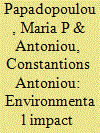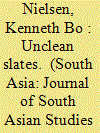| Srl | Item |
| 1 |
ID:
178620


|
|
|
|
|
| Summary/Abstract |
Adjacency, notwithstanding its status as a basis for generating maritime entitlements, has no place as a principle under the existing law of the sea. To endow it with such status in the negotiation of an agreement for the conservation and sustainable use of marine biological diversity in areas beyond national jurisdiction (BBNJ) is likely to upset the delicate balance between the rights of coastal states and those of the international community, which is essential to the widespread acceptance of United Nations Convention on the Law of the Sea (UNCLOS). This article argues that the access regime for marine genetic resources (MGRs) straddling the boundary between areas beyond national jurisdiction (ABNJ) and areas within national jurisdiction (AWNJ) should be location based, and adjacent coastal states should not be accorded preferential rights in the distribution of benefits. However, due regard should be paid to the rights and legitimate interests of adjacent coastal states when transboundary impacts may result from measures adopted for and activities conducted in ABNJ, including those that directly affect MGRs straddling the boundary between ABNJ and AWNJ. At the procedural level, coastal states should be allowed to participate, primarily through prior notification and consultation, in the adoption of area-based management tools (ABMTs) in ABNJ and the conduct of environmental impact assessment (EIA) with respect to activities therein.
|
|
|
|
|
|
|
|
|
|
|
|
|
|
|
|
| 2 |
ID:
133156


|
|
|
|
|
| Publication |
2014.
|
| Summary/Abstract |
The recent discovery of significant offshore natural gas reserves in the Aphrodite field, south of the island of Cyprus in the Mediterranean Sea, changes the energy landscape in the greater Mediterranean-Middle East-Caucasian Region. In this paper, different alternative locations for the construction and operation of a liquefied natural gas (LNG) terminal station in Cyprus were evaluated, explicitly considering also their connection to the power generation station of Mari and the country×s gateway.
The problem of determining the optimal location for an LNG terminal in Cyprus has been approached using multiple methodological components, which consider environmental and transportation issues, both technocratic in nature, as well as more subjective and based on expert opinion. The first step was a REGIME multi-criteria decision analysis used to prioritize alternative LNG terminal locations. Then, multiple modes (railroad and pipeline) of transportation connections were evaluated and geometric alignments were proposed, considering a multitude of restrictions. Finally an environmental impact assessment based on a structured questionnaire and an expert panel was conducted to validate and assess the impact of the alternative options (combination of location and transportation mode and route). During the evaluation process parameters such as safety, existing infrastructure, and access were also considered.
|
|
|
|
|
|
|
|
|
|
|
|
|
|
|
|
| 3 |
ID:
157094


|
|
|
|
|
| Summary/Abstract |
This article interrogates the discourse of ‘greenfield development’ in contemporary India with special reference to the development of a greenfield airport in Goa. By unpacking the conflictual process between carrying out and challenging environmental impact assessments (EIAs) in connection with large-scale infrastructure projects, the article analyses the EIA process as one that simultaneously induces the articulation and territorialisation of the discourse of greenfield development in particular environments, with far-reaching consequences in terms of environmental change and land dispossession.
|
|
|
|
|
|
|
|
|
|
|
|
|
|
|
|